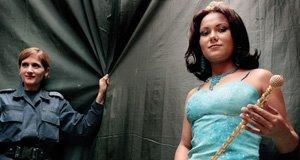La Corona

La Corona, which translates to "the crown," is a short documentary centering around a beauty pageant which takes place every year in the largest female prison in Colombia. One of the judges jokes early on that Colombia has a pageant for everything, except cocaine. The prison warden, when interviewed, says that she doesn't like the pageant very much, but it is the only time of the year that there is some peace and quiet around the prison because all of the girls look forward to it so much and want to participate.
Girls are nominated from each of the four cell blocks to represent their block in the beauty pageant. The first contestant we are introduced to is Maira Alejandro, a girl about five foot four inches in stature who was put in jail for murder. She explains in an interview that she has killed many times, which is unbelievable taking into account her size. The second contestant, Viviane Busto, was convicted of guerrilla activity. She laments her time in prison, because she has a son who she would like to eventually reunite with and teach him everything she knows. Angela Valoyes, convicted of robbery and assault, is a lesbian whose eyes sparkle as she describes passages from the Bible "that God told us to love, but he did not tell us who specifically to love." The newest convict, Angie Jimenez, has only been in jail for eighteen days. She hasn't gotten used to life in jail, especially since she also has a son on the outside.
Each of the girls chosen to compete must be prepared at all times. Meaning, they must be wearing high heels and full makeup. They also have to attend dancing and runway walking classes, like a real beauty pageant. In participating in the pageant, they become minor celebrities among the inmates. Hand-washed laundry hangs from every steel bar that covers the windows in the jail, but for the competition, the women are given designer dresses.
It seems absurd that women would have to conform to gender standards in something like a beauty pageant while they are in prison, and toward the end of the documentary you wonder who the pageant is really for: the women inside, or the great hordes of reporters who cover the pageant?
The competition only takes up about ten minutes of the documentary. The girls dance and sing with traditional Colombian songs, and there is even a swimsuit competition. When the winner is finally announced (I won't ruin it for you), she gets a full spread in the newspaper. By the end of the film, girls in other blocks complain that the competition was rigged or blame racism for why their contestant didn't win. Things go back to normal for the most part, until one of the prisoners is released. The ending is abrupt and leans hard on the idea that the pageant, while entertaining, doesn't teach the girls how to change and adapt for the better. But, as Vivianne Busto tearfully explains, "It gives us something to look forward to."
answering the question about the age of the contestants I think is about 20 years old.
Hi! I just saw the documental and I think is bittersweet, but it's real. But I have bad news I read that the winner was murdered some time later that she was released.
I saw this at a festival last year. Thanks for reviewing it! Its really great.
How old are the contestants? Because the word "girls," rather than "women" is used repeatedly, I assume this is a juvenile prison facility?